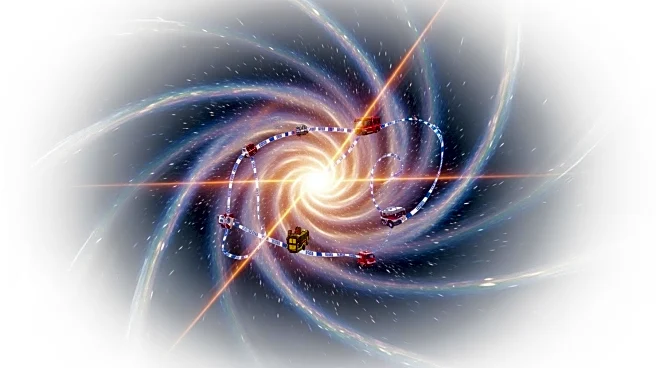What's Happening?
Astronomers have identified a tidal disruption event (TDE), named AT2024tvd, occurring 2,600 light-years from its host galaxy's center. This event marks the first time such a phenomenon has been observed
outside a galaxy's core, providing evidence for wandering supermassive black holes. The discovery was made using the Zwicky Transient Facility, which detected intense, rapidly evolving radio signals from the event. Follow-up observations revealed two significant radio outbursts, with the second showing unprecedented rapid evolution. This finding challenges current theoretical models of TDEs, which typically occur at galactic centers, and suggests the presence of more unseen wandering supermassive black holes.
Why It's Important?
The discovery of AT2024tvd is significant as it challenges existing models of tidal disruption events, which have traditionally focused on galactic centers. This event suggests that supermassive black holes can exist far from their expected locations, potentially due to galaxy mergers. The presence of such off-center black holes could mean that many more remain undetected, altering our understanding of galaxy dynamics and black hole distribution. This finding could lead to a reevaluation of search strategies, encouraging broader surveys beyond galactic centers, and potentially uncovering numerous unseen supermassive black holes.
What's Next?
The discovery of AT2024tvd may prompt astronomers to expand their search for tidal disruption events beyond galactic centers. This could lead to the identification of more off-center events, providing further insights into the behavior and distribution of supermassive black holes. Researchers may also need to develop new theoretical models to account for these findings, as current models do not explain the observed behavior. The event's unique radio emissions offer a new avenue for studying the interactions between black holes and their environments, potentially leading to a deeper understanding of cosmic phenomena.
Beyond the Headlines
The implications of AT2024tvd extend beyond immediate scientific interest, touching on broader questions about the universe's structure and the forces shaping it. The presence of wandering supermassive black holes could influence galaxy formation and evolution, affecting the distribution of matter and energy across the cosmos. This discovery also highlights the importance of technological advancements in astronomy, as new tools and methods enable the detection of previously unseen phenomena. As researchers continue to explore these off-center events, they may uncover new insights into the fundamental processes governing the universe.









